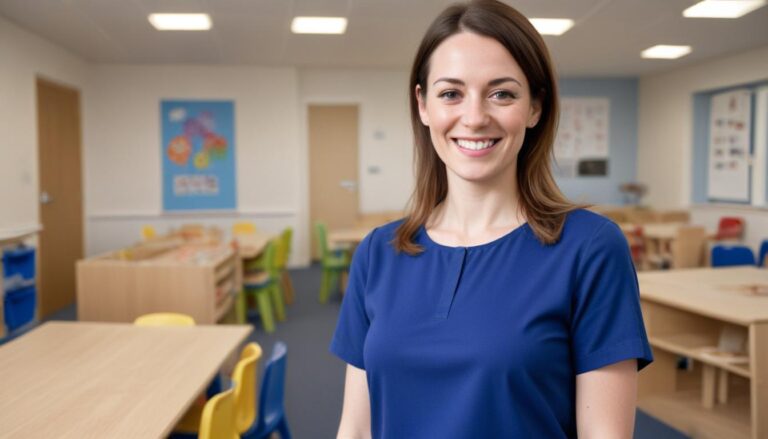
This guide will help you answer 2.2. Assess and prioritise areas for own development.
As a childcare worker, understanding how to evaluate and sequence your own developmental needs is vital. This involves identifying your skills and knowledge gaps and deciding which areas to address first, based on their importance to your role or career aspirations.
Self-Assessment Tools
To begin, you need to assess your current skills and knowledge. This can be achieved through various self-assessment tools and techniques. Some useful methods include:
- SWOT Analysis: This tool allows you to examine your Strengths, Weaknesses, Opportunities, and Threats. For example, the loving interaction you have with children might be a strength, while limited knowledge of child psychology could be a weakness.
- Reflective Journals: Writing daily or weekly reflections on your activities can help uncover areas where you feel less confident or need more training.
- Feedback from Peers and Mentors: Colleagues and supervisors can offer valuable insights into how they perceive your strengths and areas for improvement.
- Skill Audits: Completing a skill audit checklist for the childcare sector can highlight competencies you have mastered and those that require further attention.
Establishing Your Goals
Once you have identified the areas needing development, establishing clear and achievable goals is the next step. Use the SMART criteria to set your goals: Specific, Measurable, Achievable, Relevant, and Time-bound. For instance, “Improve understanding of early childhood legislation by attending a workshop within the next three months” is a SMART goal.
Identifying Training and Development Opportunities
Find suitable training and development opportunities to meet your goals. These could include:
- Workshops and Seminars: Attending sessions on topics such as safeguarding, behaviour management strategies, or early childhood development.
- Online Courses: Platforms like EduCare or FutureLearn offer courses relevant to childcare. These can be tailored to fit around your current working commitments.
- In-house Training: Many organisations offer internal training sessions. Speak with your manager about what might be available to you.
- Mentoring: Seek out mentoring opportunities within your organisation to gain direct assistance and advice in your identified areas of development.
- Networking: Engaging with fellow early years practitioners through professional networks or forums can provide support and new ideas.
Prioritising Developmental Areas
Not all developmental areas can be addressed at once, so prioritising is key. Consider the following when determining which to tackle first:
- Urgency: Is there an area of development that impacts your current job performance significantly?
- Impact: Which skills, when improved, will offer the greatest benefit to children in your care or to your team?
- Opportunities for Immediate Application: Focus on skills or knowledge that you can apply immediately in your role, offering a practical benefit.
- Career Progression: Prioritise skills that align with your long-term career goals, such as moving into a more senior childcare role or specializing in a specific area like SEN (Special Education Needs).
Creating a Personal Development Plan (PDP)
Document your goals and how you plan to achieve them in a Personal Development Plan. This should include:
- Goals: List your SMART goals clearly.
- Actions: Detail the steps you will take to reach these goals, such as signing up for courses or finding a mentor.
- Resources: Identify resources you will need, such as time, financial support, or study materials.
- Timeline: Set deadlines for each goal to keep you on track.
- Review Points: Schedule regular times to review and adjust your plan as needed.
Monitoring Progress
Regular monitoring of your progress is essential. Keep track of what you have achieved and reflect on any hurdles or changes in your priorities. Adjust your PDP accordingly, adding new goals as you complete tasks or as your circumstances change.
- Self-Reflection: Continuously reflect on your growth and any challenges you face.
- Feedback: Seek regular feedback from supervisors and peers to gain insights into your progress.
Seeking Support
Never hesitate to seek support if you’re finding it challenging to meet your developmental needs. This support can take various forms:
- Manager: Discussing your development goals and progress with your manager can help you gain additional support or resources.
- Training Coordinator: Engage with a training coordinator who might be able to suggest additional resources or adjustments to your current load.
- Peer Support: Colleagues can offer perspectives from their own experiences and keep you motivated.
Staying Motivated
Maintaining motivation throughout your development journey can be difficult, but it is vital for success. Here are some tips:
- Celebrate Small Wins: Every step forward is progress, so take a moment to appreciate your efforts and achievements.
- Visualise Success: Keep reminders of your goals and envision the benefits that come with personal growth.
- Stay Flexible: Be open to adjusting your plan if you find a shift in priorities or interests.
Reflecting and Adapting
As you develop and priorities change, it’s important to reflect and adapt your approach. Reflection helps in recognising patterns of behaviour or skills that impact your work positively or negatively. This continuous feedback loop helps in remaining effective and satisfied in your role.
Changing Needs of the Sector
The early years sector is subject to change due to policy updates, advancements in educational research, and societal trends. Keep informed about external changes that might affect the skills you need:
- Attend Industry Conferences: Where major policy shifts and emerging practices are often discussed.
- Join Professional Organisations: They offer newsletters and resources to keep you informed.
- Continuous Learning: Commit to lifelong learning. The more adaptable you are, the better prepared you will be for change.
Aligning Development with Organisational Goals
Aligning your development with your organisation’s goals can create a win-win situation. For instance, increasing your understanding of new curriculum methods could support an organisational goal to enhance educational outcomes. Engage in discussions to ensure that your development plans consider these organisational needs.
Ethical Considerations
In your quest for development, don’t forget the ethical considerations. Always ensure that development activities are carried out with integrity and respect for colleague and child confidentiality. This builds trust and sets a positive example within your work environment.
Final Thoughts
Assessing and arranging your development areas aids both personal growth and professional effectiveness. By using self-assessment and planning tools, prioritising effectively, seeking and applying feedback, staying up-to-date with sector changes, aligning personal goals with organisational objectives, and considering ethical implications, you set a course for ongoing success in the childcare sector. As you work through your PDP, you’ll find that continuous reflection helps you remain resilient and adaptable, benefitting both your career and the children you care for.
Subscribe to Newsletter
Get the latest news and updates from Care Learning and be first to know about our free courses when they launch.






